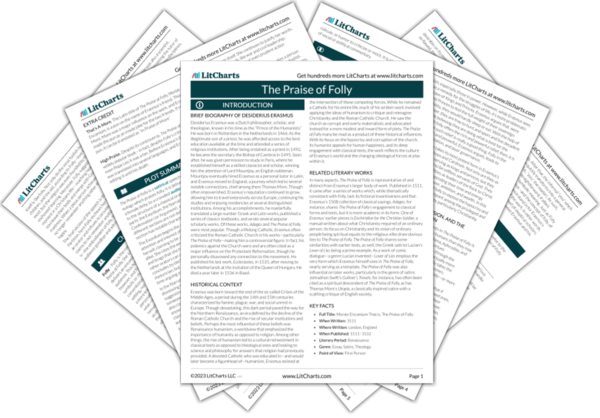In many ways, The Praise of Folly functions as a social critique of Erasmus’s time. Through the guise of eulogizing folly, Erasmus allows himself to point out the various ways in which almost everyone in the world is foolish, especially those in power. However, while Erasmus sees folly as a remedy for the struggles of life, it’s more problematic in the case of Kings and Princes. Erasmus argues that, were Kings and Princes to feel the full weight of their sovereign responsibility, they would hardly sleep or eat. With the help of folly, however, they are free to hunt and sport and live decadent lives, all while believing they are doing what is best for the realm. Though folly offers the rich and powerful relief, then, it is hard to say that such relief is really a good thing. Folly in the hands of the rich and powerful, Erasmus argues, leads to corruption, exploitation, and poor governance.
This line of criticism takes its most potent form in Erasmus’s vitriolic attack of Bishops and Cardinals. Not only are they as irresponsible and self-serving as kings and princes, but they simultaneously pretend to be selfless servants of God. They relegate their responsibilities as leaders of the flock to Christ himself or their deputies, spending their time and energy instead on accumulating power, ambition, and wealth. In this way, Erasmus uses the lens of folly to expose the hypocrisy and moral bankruptcy that runs rampant among the privileged and influential members of his society, particularly Christianity.
Power, Privilege, and Hypocrisy ThemeTracker

Power, Privilege, and Hypocrisy Quotes in The Praise of Folly
Nothing is more puerile, certainly, than to treat serious matters triflingly; but nothing is more graceful than to handle light subjects in such a way that you seem to have been anything but trifling. The judgement of others upon me will be what it will be. Yet unless self-love deceives me badly, I have praised folly in a way that is not wholly foolish.
But aside from the fact that I refrain throughout from using names, I have in addition tempered my style that the judicious reader will easily perceive that my end is pleasure rather than censure.
However mortal folk may commonly speak of me (for I am not ignorant how ill the name of Folly sounds, even to the greatest fools), I am she – the only she, I may say–whose divine influence makes gods and men rejoice.
So it is from this brisk and silly little game of mine come forth the haughty philosophers (to whose places those are vulgarly called monks have now succeeded), and kings in their scarlet, pious priests, and triply most holy popes; also, finally, that assembly of the gods of the poets, so numerous that Olympus, spacious as it is, can hardly accommodate the crowd.
For do you not see that the austere fellows who are buried in the study of philosophy, or condemned to difficult and wracking business, grow old even before they have been young–and this because by cares and continual hard driving of their brains they insensibly exhaust their spirits and dry up their radical moisture. On the contrary, my morons are as plump and sleek as the hogs of Acarnania (as the saying is), with complexions well cared for, never feeling the touch of old age; unless as rarely happens, they catch something by contagion from the wise—so true it is that the life of man is not destined to be happy.
If something is to be bought, or a contract made, if in short, any of those things without which our daily life could not be carried on must be done, you will say that this wiseacre is no man, but dead wood. Thus he can be of little use to himself, his country, or his family, and all because he is inexpert in everyday matters, and far out of step with general ways of thinking and modes of life among the folk; by the same token he is bound to fall into odium, through the great diversity between his and their lives and minds. For what that passes among mortals everywhere is not full of folly, done by fools in the presence of fools?
If a prince really laid his own life alongside these symbols, I believe he would have the grace to be ashamed of his finery. He would be afraid some nosy satirist might turn the whole spectacle, suited as it is for high tragedy, into laughter and derision.
Were wisdom to descend upon them, how it would inconvenience them! Wisdom, did I say? Nay, even a grain of salt would do it–a grain of that salt which is spoken of by Christ. It would lose them all that wealth and honor, all those possessions, triumphal progresses, offices, dispensations, tributes, and indulgences; it would lose them so many horses, mules, and retainers; so many pleasures.
To work miracles is primitive and old-fashioned, hardly suited it our times; to instruct the people is irksome; to interpret the Holy Scripture is pedantry; to pray is otiose; to shed tears is distressing and womanish; to live in poverty is sordid; to be beaten in war is dishonorable and less than worthy of one who will hardly admit kings, however great, to kiss his foot, and finally, to die is unpleasant, to die on the cross a disgrace.
And although war is so cruel a business that it befits beasts and not men, so frantic that poets feign it is sent with evil purpose by the Furies, so pestilential that it brings with it a general blight upon morals, so iniquitous that is usually conducted by the worst bandits, so impious that it has no accord with Christ, yet our popes, neglecting all their other concerns, make it their only task.











